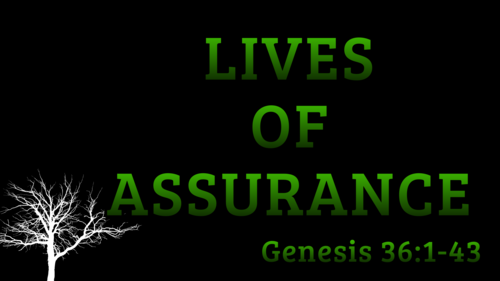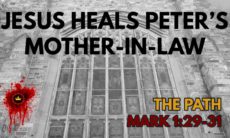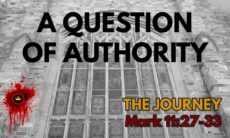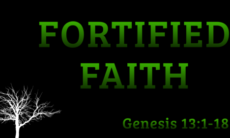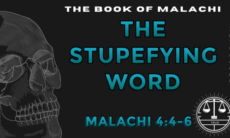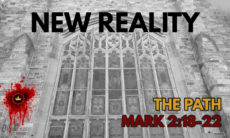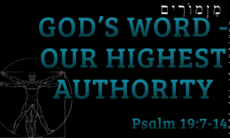Genesis: AUTHORITY
Lives Of Assurance: Genesis 36:1-43
Pastor John Weathersby
Sunday October 15, 2023
Notes, not at Transcript:
Perhaps you’re looking at this list thinking – what will we do here? I want to tell you that this is an amazing portion of scripture because, for the Children of God, it is a lights-on moment where you step back and are wowed by God’s sovereignty, freshly – and empowered as His to live a life of assurance.
You flip past Romans 8:28 and get to Romans 8:31 and marvel, thinking it’s true!
Romans 8:28 (ESV)
28 And we know that for those who love God all things work together for good, for those who are called according to his purpose.
Romans 8:31 (ESV)
God’s Everlasting Love
31 What then shall we say to these things? If God is for us, who can be against us?
Who can be against us?
Genesis 36:1-43 (ESV)
Esau’s Descendants
1 These are the generations of Esau (that is, Edom).
2 Esau took his wives from the Canaanites: Adah the daughter of Elon the Hittite, Oholibamah the daughter of Anah the daughter of Zibeon the Hivite,
3 and Basemath, Ishmael’s daughter, the sister of Nebaioth.
4 And Adah bore to Esau, Eliphaz; Basemath bore Reuel;
5 and Oholibamah bore Jeush, Jalam, and Korah. These are the sons of Esau who were born to him in the land of Canaan.
Before we go forward, let’s go back. Back to Genesis 27, where we find in Genesis 26, Isaac cuts an oath for peace with Abimelech in the land after the quarrel over the well, and they recognize God is with Isaac.
Next, we find Isaac in Genesis 27 at the end of his life, calling on Esau (his older son first) and Jacob. Esau is to go into the field and bring back game for his father, and then they are to receive their blessings – Jacob and his mother trick Isaac into giving Jacob the blessing. We see the recap in Genesis 27:31-40
Genesis 27:31–40 (ESV)
31 He also prepared delicious food and brought it to his father. And he said to his father, “Let my father arise and eat of his son’s game, that you may bless me.”
32 His father Isaac said to him, “Who are you?” He answered, “I am your son, your firstborn, Esau.”
33 Then Isaac trembled very violently and said, “Who was it then that hunted game and brought it to me, and I ate it all before you came, and I have blessed him? Yes, and he shall be blessed.”
34 As soon as Esau heard the words of his father, he cried out with an exceedingly great and bitter cry and said to his father, “Bless me, even me also, O my father!”
35 But he said, “Your brother came deceitfully, and he has taken away your blessing.”
36 Esau said, “Is he not rightly named Jacob? For he has cheated me these two times. He took away my birthright, and behold, now he has taken away my blessing.” Then he said, “Have you not reserved a blessing for me?”
37 Isaac answered and said to Esau, “Behold, I have made him lord over you, and all his brothers I have given to him for servants, and with grain and wine I have sustained him. What then can I do for you, my son?”
38 Esau said to his father, “Have you but one blessing, my father? Bless me, even me also, O my father.” And Esau lifted up his voice and wept.
39 Then Isaac his father answered and said to him:
“Behold, away from the fatness of the earth shall your dwelling be,
and away from the dew of heaven on high.
40 By your sword you shall live,
and you shall serve your brother;
but when you grow restless
you shall break his yoke from your neck.”
Romans 9:13 (ESV)
13 As it is written, “Jacob I loved, but Esau I hated.”
Jacob earned the blessing through trickery – he wasn’t more deserving; instead, God was sovereign over the choice between the older (who rightly would have the blessing) and the younger, who would not.
And so, we have this telling of his generations – God allowed Esau to be temporally blessed with things, possessions, and family. Still, the sovereign voice for building the nation that God would introduce His grace and bring in His son would be through Jacob. Moses records Esau’s line but primarily lost to time. There are few more mentions of him outside of Malachi 1:3-5
Malachi 1:3–5 (ESV)
3 but Esau I have hated. I have laid waste his hill country and left his heritage to jackals of the desert.”
4 If Edom says, “We are shattered but we will rebuild the ruins,” the Lord of hosts says, “They may build, but I will tear down, and they will be called ‘the wicked country,’ and ‘the people with whom the Lord is angry forever.’ ”
5 Your own eyes shall see this, and you shall say, “Great is the Lord beyond the border of Israel!”
6 Then Esau took his wives, his sons, his daughters, and all the members of his household, his livestock, all his beasts, and all his property that he had acquired in the land of Canaan. He went into a land away from his brother Jacob.
7 For their possessions were too great for them to dwell together. The land of their sojournings could not support them because of their livestock.
8 So Esau settled in the hill country of Seir. (Esau is Edom.)
We see how this move of Genesis 36:6-7 and land acquisition took place.
Deuteronomy 2:12 (ESV)
12 The Horites also lived in Seir formerly, but the people of Esau dispossessed them and destroyed them from before them and settled in their place, as Israel did to the land of their possession, which the Lord gave to them.)
So Esau takes land, giving his brother Jacob all the land, as God promised in Genesis 28:3-4 when Jacob is initially sent to Laban in Paddan-aram, Isaac said to Jacob:
Genesis 28:3–4 (ESV)
3 God Almighty bless you and make you fruitful and multiply you, that you may become a company of peoples.
4 May he give the blessing of Abraham to you and to your offspring with you, that you may take possession of the land of your sojournings that God gave to Abraham!”
We clearly see the sovereign hand of God acting here, which should encourage a life of assurance what God says is what will be. There is NO BETTER commentary on scripture than scripture, so let’s look to Joshua chapter 24.
Before we read it, you’ll see Shechem mentioned, and perhaps your Bible student’s Genesis-focused mind will say, I know Shechem, and you do! We hear of it first in Genesis 12:6, with the Lord promising Abraham the land to his offspring. In Joshua 24, we see it is where Joseph’s remains are buried.
Genesis 12:6 (ESV)
6 Abram passed through the land to the place at Shechem, to the oak of Moreh. At that time the Canaanites were in the land.
It will only be mentioned once in the NT in Stephen’s sermon in Acts 7, where Stephen has been seised through trickery, saying he was a blasphemer. Still, they couldn’t stand the Sprit’s argumentation for truth in Him. Opposition to God never functions in the light. Stephen tracks Abraham through the land where they are, noting that Israel would be sojourners and the need to worship God. He demonstrated God being with them despite their disobedience, and in the midst of that, he notes Jacobs’s return and burial in the land of Shechem.
Joshua 24:1–4 (ESV)
1 Joshua gathered all the tribes of Israel to Shechem and summoned the elders, the heads, the judges, and the officers of Israel. And they presented themselves before God.
2 And Joshua said to all the people, “Thus says the Lord, the God of Israel, ‘Long ago, your fathers lived beyond the Euphrates, Terah, the father of Abraham and of Nahor; and they served other gods.
3 Then I took your father Abraham from beyond the River and led him through all the land of Canaan, and made his offspring many. I gave him Isaac.
4 And to Isaac I gave Jacob and Esau. And I gave Esau the hill country of Seir to possess, but Jacob and his children went down to Egypt.
You see, in verse 4, we see in Genesis that Esau willingly went to Seir, but we see in Joshua God revealing HE was behind the land division; this is because God promised the land to Abraham and his offspring – to the line of the Patriarchy and God is sovereignly working through people accomplishing His Will. What God says is what will be, and this gives Him a life of assurance.
Next, Moses will go into a telling of the Generation of Esau and show him as the father of the Edomites. The Edomites are evidence of Jacob and Esau’s beginning. They struggled in the womb, and Rebekah knew they’d be two nations.
Genesis 25:23 (ESV)
23 And the Lord said to her,
“Two nations are in your womb,
and two peoples from within you shall be divided;
the one shall be stronger than the other,
the older shall serve the younger.”
They are very divided between the Edomites and the Israelites. Later, the Edomites would be conquered by Alexander the Great, making Greek the language and renaming the land and thus the name of the Edomite people to the Idumeans. Imagine being someone who knows you were cheated out of your birthright by your descendant’s younger brother. You’d likely have contention, and they did, as God told Rebekah they would.
Herod the Great was an Idumean, seeing himself then as a participant in the covenant made with Abraham and the rightful owner of the land. Think of a passage we read so frequently at Christmas time (Matthew 2:1-3) and allow the Genesis connection to bring the Bible to life for you:
Matthew 2:1–3 (ESV)
1 Now after Jesus was born in Bethlehem of Judea in the days of Herod the king, behold, wise men from the east came to Jerusalem,
2 saying, “Where is he who has been born king of the Jews? For we saw his star when it rose and have come to worship him.”
3 When Herod the king heard this, he was troubled, and all Jerusalem with him;
Herod, the Idumean the Edomite, thinking a King of (how he would perceive it) the stolen line rightfully available to him is a threat to his dynasty. Yet God would sovereignly protect the Christ and provide a way for Him to live: see Matthew 2:22.
Matthew 2:22 (ESV)
22 But when he heard that Archelaus was reigning over Judea in place of his father Herod, he was afraid to go there, and being warned in a dream he withdrew to the district of Galilee.
Joseph went to Galilee, where Archelus didn’t have power, the struggle between the Kingdoms would continue, and we get an interesting interaction in Luke 13.
Luke 13:31–32 (ESV)
Lament over Jerusalem
31 At that very hour some Pharisees came and said to him, “Get away from here, for Herod wants to kill you.”
32 And he said to them, “Go and tell that fox, ‘Behold, I cast out demons and perform cures today and tomorrow, and the third day I finish my course.
And so, God gives a glimpse into the time-bound descendants of Esau and the Edomites:
9 These are the generations of Esau the father of the Edomites in the hill country of Seir.
10 These are the names of Esau’s sons: Eliphaz the son of Adah the wife of Esau, Reuel the son of Basemath the wife of Esau.
11 The sons of Eliphaz were Teman, Omar, Zepho, Gatam, and Kenaz.
12 (Timna was a concubine of Eliphaz, Esau’s son; she bore Amalek to Eliphaz.) These are the sons of Adah, Esau’s wife.
13 These are the sons of Reuel: Nahath, Zerah, Shammah, and Mizzah. These are the sons of Basemath, Esau’s wife.
14 These are the sons of Oholibamah the daughter of Anah the daughter of Zibeon, Esau’s wife: she bore to Esau Jeush, Jalam, and Korah.
15 These are the chiefs of the sons of Esau. The sons of Eliphaz the firstborn of Esau: the chiefs Teman, Omar, Zepho, Kenaz,
16 Korah, Gatam, and Amalek; these are the chiefs of Eliphaz in the land of Edom; these are the sons of Adah.
17 These are the sons of Reuel, Esau’s son: the chiefs Nahath, Zerah, Shammah, and Mizzah; these are the chiefs of Reuel in the land of Edom; these are the sons of Basemath, Esau’s wife.
18 These are the sons of Oholibamah, Esau’s wife: the chiefs Jeush, Jalam, and Korah; these are the chiefs born of Oholibamah the daughter of Anah, Esau’s wife.
19 These are the sons of Esau (that is, Edom), and these are their chiefs.
20 These are the sons of Seir the Horite, the inhabitants of the land: Lotan, Shobal, Zibeon, Anah,
21 Dishon, Ezer, and Dishan; these are the chiefs of the Horites, the sons of Seir in the land of Edom.
22 The sons of Lotan were Hori and Hemam; and Lotan’s sister was Timna.
23 These are the sons of Shobal: Alvan, Manahath, Ebal, Shepho, and Onam.
24 These are the sons of Zibeon: Aiah and Anah; he is the Anah who found the hot springs in the wilderness, as he pastured the donkeys of Zibeon his father.
25 These are the children of Anah: Dishon and Oholibamah the daughter of Anah.
26 These are the sons of Dishon: Hemdan, Eshban, Ithran, and Cheran.
27 These are the sons of Ezer: Bilhan, Zaavan, and Akan.
28 These are the sons of Dishan: Uz and Aran.
29 These are the chiefs of the Horites: the chiefs Lotan, Shobal, Zibeon, Anah,
30 Dishon, Ezer, and Dishan; these are the chiefs of the Horites, chief by chief in the land of Seir.
We see they were ruled by Kings:
31 These are the kings who reigned in the land of Edom, before any king reigned over the Israelites.
32 Bela the son of Beor reigned in Edom, the name of his city being Dinhabah.
33 Bela died, and Jobab the son of Zerah of Bozrah reigned in his place.
34 Jobab died, and Husham of the land of the Temanites reigned in his place.
35 Husham died, and Hadad the son of Bedad, who defeated Midian in the country of Moab, reigned in his place, the name of his city being Avith.
36 Hadad died, and Samlah of Masrekah reigned in his place.
37 Samlah died, and Shaul of Rehoboth on the Euphrates reigned in his place.
38 Shaul died, and Baal-hanan the son of Achbor reigned in his place.
39 Baal-hanan the son of Achbor died, and Hadar reigned in his place, the name of his city being Pau; his wife’s name was Mehetabel, the daughter of Matred, daughter of Mezahab.
40 These are the names of the chiefs of Esau, according to their clans and their dwelling places, by their names: the chiefs Timna, Alvah, Jetheth,
41 Oholibamah, Elah, Pinon,
42 Kenaz, Teman, Mibzar,
43 Magdiel, and Iram; these are the chiefs of Edom (that is, Esau, the father of Edom), according to their dwelling places in the land of their possession.
What do we see, the sovereign power of God on display? If you lived during the Edomites, perhaps your time-bound self would look to God and say, but we’re without power; they’re thriving. But ultimately, they were overcome; Christ came and was safe, he lived, and His ministry accomplished the will of God. To live in all ways like us, tempted and tried
Hebrews 4:14–16 (ESV)
Jesus the Great High Priest
14 Since then we have a great high priest who has passed through the heavens, Jesus, the Son of God, let us hold fast our confession.
15 For we do not have a high priest who is unable to sympathize with our weaknesses, but one who in every respect has been tempted as we are, yet without sin.
16 Let us then with confidence draw near to the throne of grace, that we may receive mercy and find grace to help in time of need.
You flip past Romans 8:28 and get to Romans 8:31 and marvel, thinking it’s true!
Romans 8:31 (ESV)
God’s Everlasting Love
31 What then shall we say to these things? If God is for us, who can be against us?
Who can be against us?
Jesus came through impossible circumstances and odds to establish the Church and return to the Father’s right hand as our advocate.
Romans 8:34 (ESV)
34 Who is to condemn? Christ Jesus is the one who died—more than that, who was raised—who is at the right hand of God, who indeed is interceding for us.
Church, this should be such an encouraging study to see the Bible come to life and see God’s faithfulness through time, that His promises come to pass, not because He is good at working in the chaos and keeping up with Evil, but that he sovereignly causes His will to be.
Psalm 102:25–28 (ESV)
25 Of old you laid the foundation of the earth,
and the heavens are the work of your hands.
26 They will perish, but you will remain;
they will all wear out like a garment.
You will change them like a robe, and they will pass away,
27 but you are the same, and your years have no end.
28 The children of your servants shall dwell secure;
their offspring shall be established before you.
Pray, Observe, Apply.


